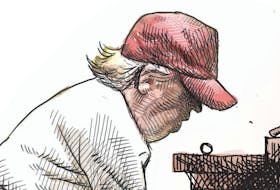Why wait another month to report on the Russian election (March 18th) when we can wrap it up right now? Vladimir Putin is going to win another six years in power by a landslide — probably between 60 per cent and 70 per cent of the popular vote. The real question is what happens after that, because he will be 72 by the end of his next term and will not legally be allowed to run for president again.

Putin doesn’t take chances, so he has barred opposition leader Alexei Navalny from standing in the election by having the obedient courts convict him of fraud on a trumped-up charge. Not that Navalny ever threatened to beat Putin, who is genuinely popular in Russia, but none of the other presidential candidates in this election are even serious contenders. Their only function is to make the election look legitimate.
First up is Ksenia Sobchak, a former TV “reality” show host whose wealth and establishment links (her father Anatoly was the mayor of St. Petersburg and Putin’s political mentor) have earned her the mocking title of “Russia’s Paris Hilton.” She’s liberal, pro-gay, all the things that Putin isn’t, but she is nevertheless seen as his preferred opponent, and not to be taken seriously.
Certainly the youthful Communist candidate, Pavel Grudinin, the boss of a former collective farm enterprise called Lenin State Farm, is not to be taken seriously. Neither is Vladimir Zhirinovsky, a raving ultra-nationalist caricature of a man. Putin will win in a walk — and yet Russia is a modern, well-educated country with a democratic constitution. It must one day take charge of its own affairs, but when and how?
Russia is in an unending political holding pattern, forever circling the destination of democracy but unable to land. It’s easy to explain how it got into this dead-end, much harder to see how it gets out of it.
The collapse of more than 70 years of Communist dictatorship in 1987-91 left most Russians in a state of shock. The young felt liberated, the older generation was apprehensive, but nobody quite knew what to do next. The first and last truly competitive elections were held in that period, but by the mid-1990s the oligarchs (mostly ex-Communists) were back in the saddle.
The oligarchs had “privatized” the formerly state-owned economy into their own pockets (with a little help from the local mafia), and they had co-opted President Boris Yeltsin as their frontman. Freely elected and once popular for his dramatic defence of democracy in the attempted Communist comeback coup of 1991, Yeltsin was a drunken and corrupt wreck of a man by the time of the 1996 election.
He “won” that election thanks to massive Western and particularly U.S. intervention in support of their favoured candidate (the traffic goes both ways), but his mismanagement of the economy wiped out the savings of most Russians and brought democracy itself into disrepute. Down to this day many Russians associate the word “democracy” with the lawless and violent chaos of the ’90s.
Putin, Yeltsin’s chosen successor, has maintained his popularity through 18 years in power because he has provided Russians with what they wanted above all: a fair degree of stability and predictability in their lives. Living standards for most Russians are probably still below what they were in late Soviet times, but they were slowly but steadily rising from their 1990s nadir until the collapse of oil prices three years ago.
He is for all practical purposes a dictator, of course, although by Russian historical standards a fairly non-violent one.
Putin’s foreign adventures (Georgia, Crimea, eastern Ukraine) are essentially defensive from a Russian point of view. Countries that were once part of the Russian empire and the Soviet Union are known as the “Near Abroad,” where different rules of conduct supposedly apply, but Western fears of Russian military ambitions against NATO countries are largely self-serving myths peddled by Western military-industrial-political complexes.
In fact, Russia is far too weak economically and too fragile politically to embark on a military confrontation with any of the major powers. Putin is a deeply cautious man whose conservatism have given Russia a desperately needed respite from continuous and ruinous political upheavals.
He is for all practical purposes a dictator, of course, although by Russian historical standards a fairly non-violent one. And he has always meticulously observed the constitutional rules, even leaving the presidency and serving as prime minister in 2008-12 in order to comply with the ban on more than two consecutive presidential terms.
It sometimes feels like Putin, for all his faults, sees himself as a caretaker leader until Russia is strong and stable enough to try democracy again. He has certainly been careful to leave the entire legal structure of democracy in place, although he manipulates it ruthlessly for his own short-term purposes.
And the great unanswered question is: how would a post-Putin Russia revive the democratic experiment it embarked on in 1989-91, in the face of certain opposition from the oligarchs who benefit so greatly from current arrangements?
We may find out in the 2024 election, when Putin again comes up against the two-term limit.
Gwynne Dyer is an independent journalist whose articles are published in 45 countries.








